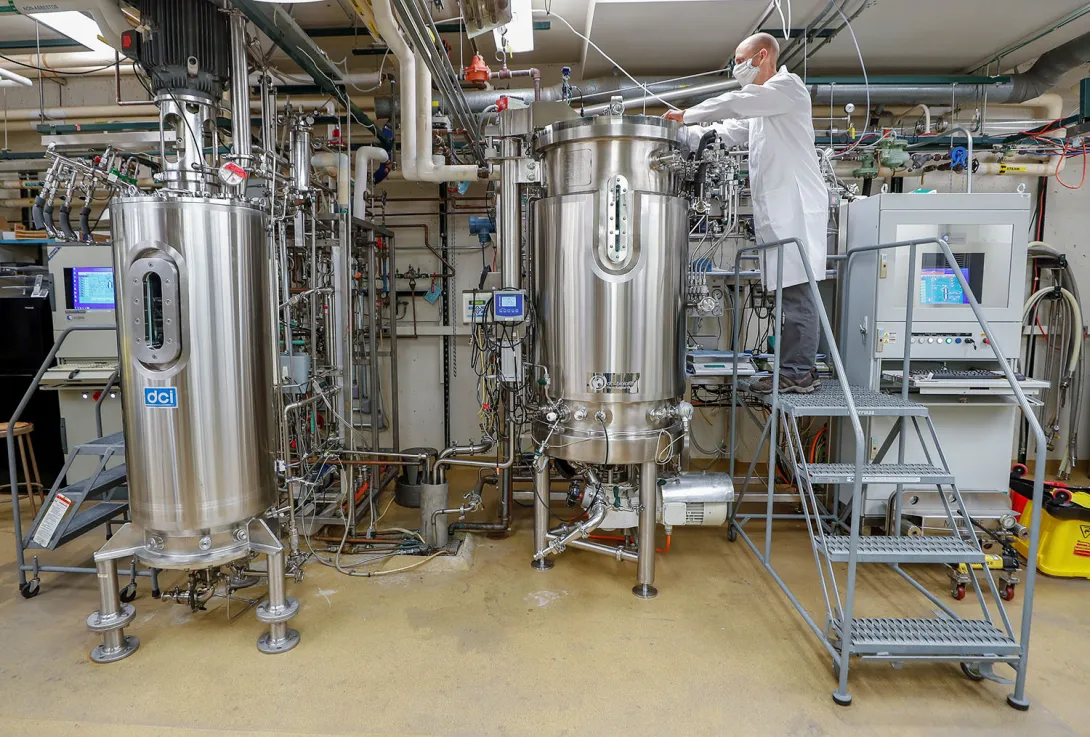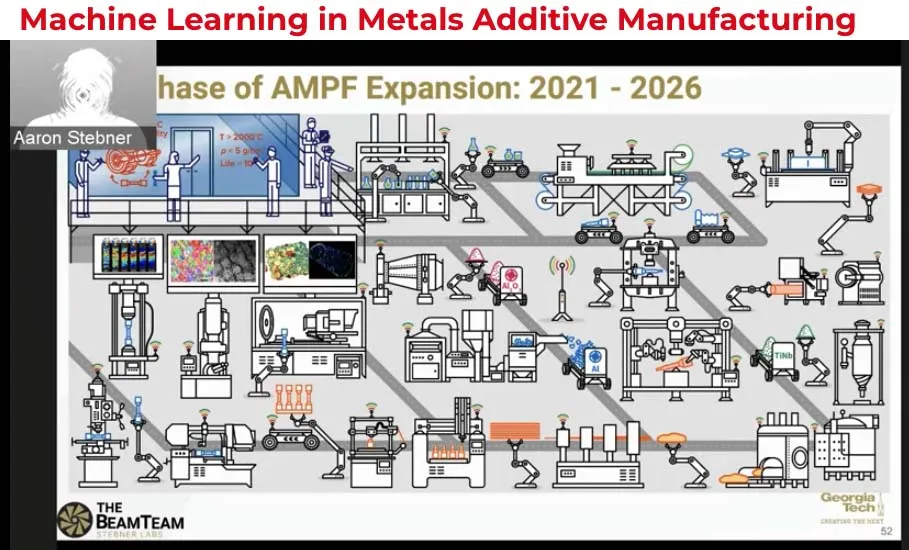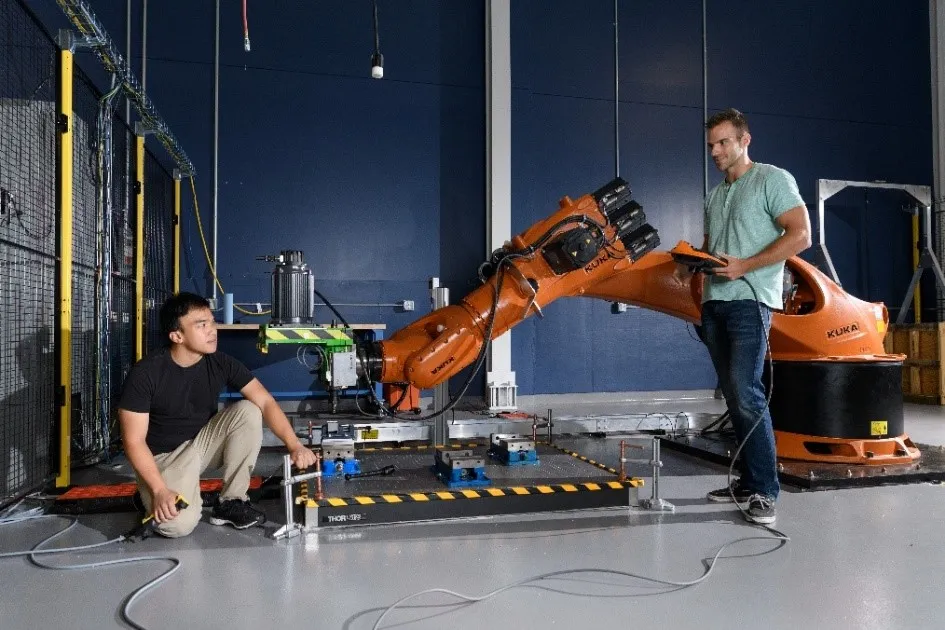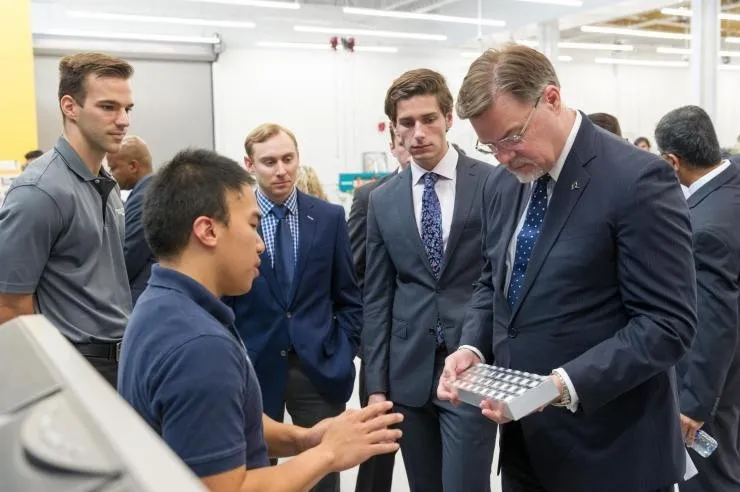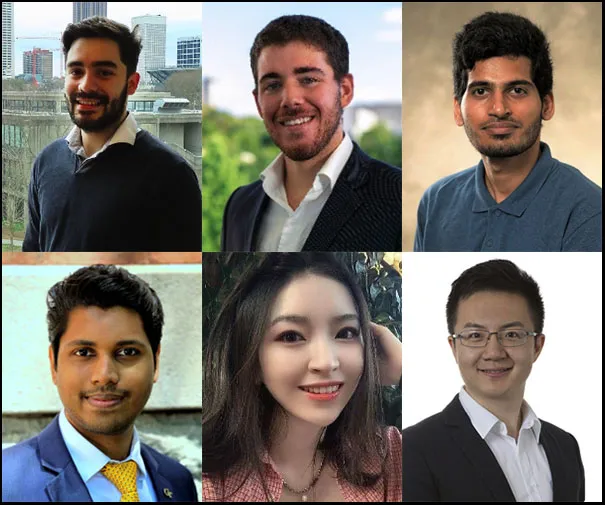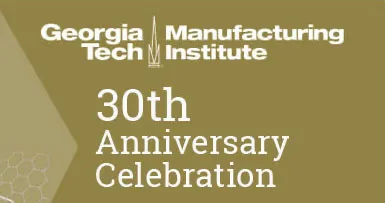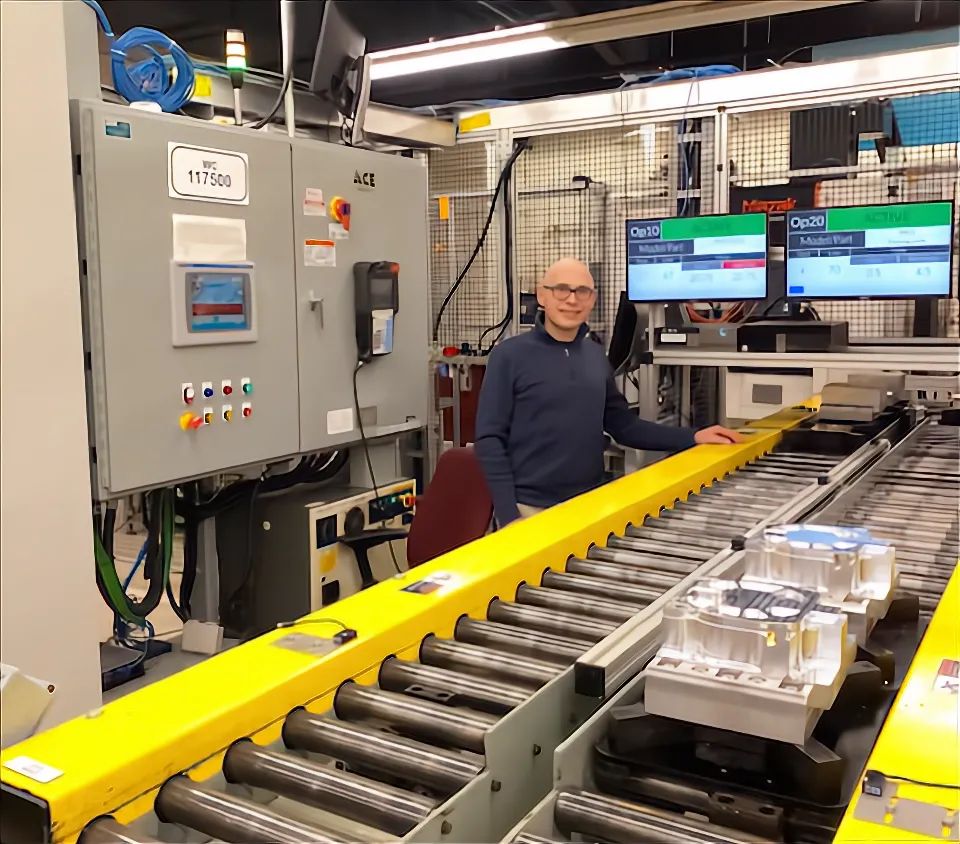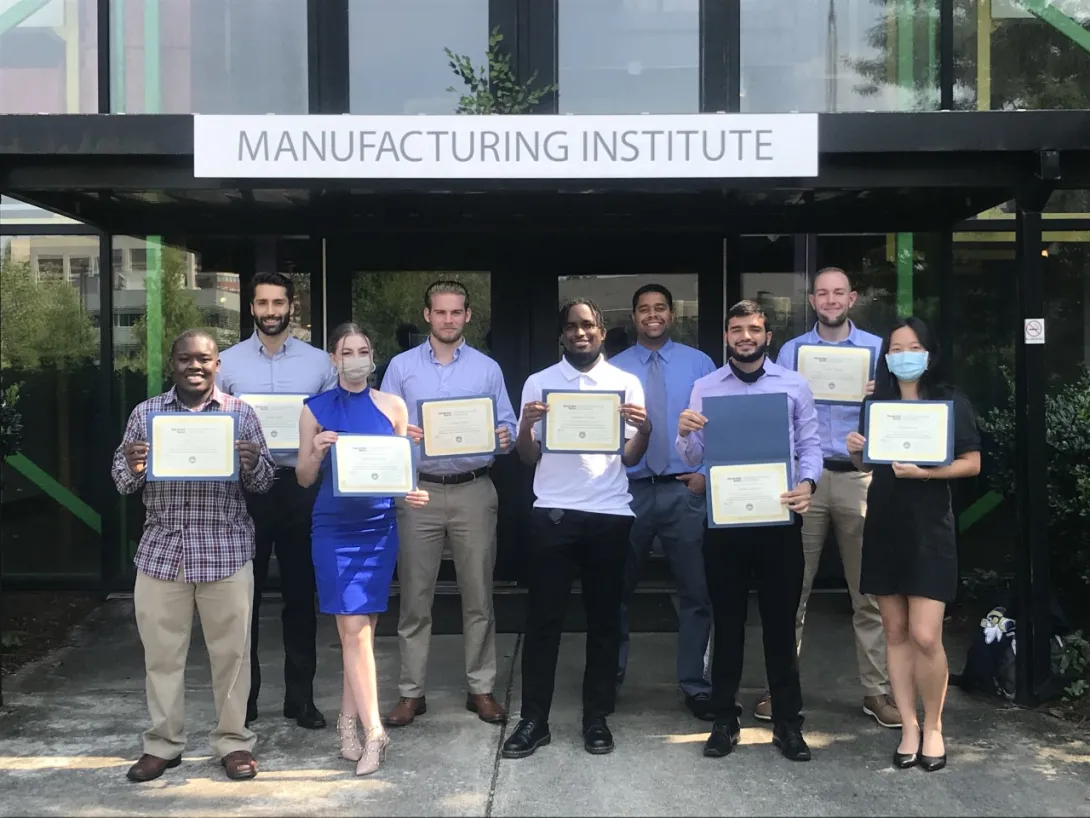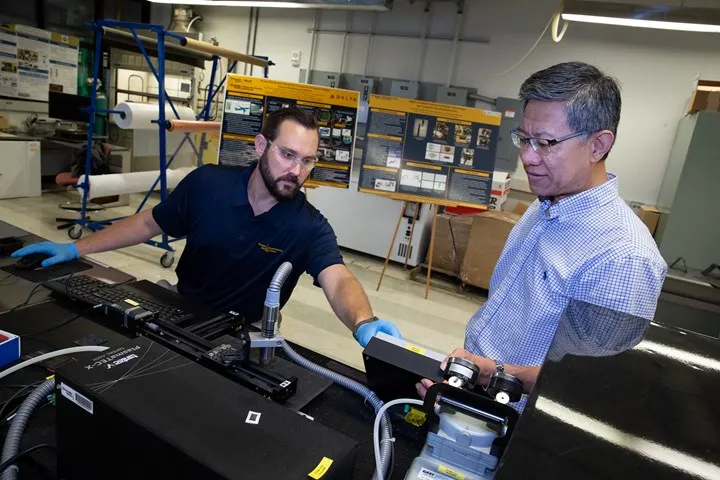Apr. 07, 2022
The SecureAmerica Institute (SAI) and the Advanced Robotics for Manufacturing (ARM) Institute are partnering with Georgia Tech to investigate how robotics and automation in manufacturing can enhance the resiliency, flexibility, and competitiveness of U.S. industrial base supply chains, thanks to a $5 million grant award from the U.S. Department of Commerce’s National Institute of Standards and Technology (NIST).
The project plans to create the Robotics and Automation Decision Framework for Agility and Resilience (RADAR). This framework will allow small and medium-sized manufacturers (SMMs) to systemically evaluate the cost-to-benefit ratio of integrating robotics and automation for aiding the response to supply chain disruptions due to public health crises like COVID-19 and additional economic threats.
“The RADAR end-to-end supply chain framework encompasses macro-scale and micro-scale modeling, along with physical demonstration, by bringing together interdisciplinary capabilities of elite partners from SAI and ARM — including the Texas Manufacturing Assistance Center, Georgia Institute of Technology, General Electric, Deloitte, and Morgan State University — to serve the requirements set by NIST,” said Eleftherios Lakovou, Ph.D., SAI’s manufacturing supply chain director and principal investigator on the project.
He sees the award as an exciting and potent validation of the unique footprint SAI has established and a way for the institute to provide innovative solutions to national priorities.
“The project is particularly valuable because it empowers SMMs, who form the backbone of the nation’s industrial base,” Lakovou continued. “Small manufacturers often lack the scale and human capital needed to increase their use of automation and robotics to position themselves favorably in the sophisticated, next-generation, cost-competitive, agile and resilient supply chains of America’s future.”
“We are delighted to work with the team at the SecureAmerica Institute on this important project,” said Arnie Kravitz, chief innovation officer at the ARM Institute. “Our work will help smaller manufacturers make better decisions in the face of the current and future pandemics.”
The Georgia Tech team will contribute to this initiative by providing already developed and validated supply chain simulation software and extending it to stress test supply chains so that small manufacturers can be better informed of what risks their supply chains might face, how these risks can be mitigated, and what role robotics and automation can play as a source of supply chain productivity and risk mitigation.
RADAR’s funding is provided by the American Rescue Act and is part of a larger $54 million initiative by NIST to award high-impact projects for pandemic response research and development across eight manufacturing institutes in the Manufacturing USA network.
News Contact
Walter Rich
Mar. 03, 2022
BioMADE, a Manufacturing Innovation Institute sponsored by the U.S. Department of Defense, has recently funded a research project at Georgia Tech entitled ‘Stress Testing Supply Chains and their Ecosystems for Levels of Trust, Security, Resilience, Agility, and Competitiveness’. Headed by faculty members Chip White, Kevin Wang, and Ben Wang, this project will design, develop, and validate a simulation platform to stress test end-to-end bioindustrial manufacturing facilities and supply chains resiliency over multiple risks with the intent of strengthening American competitiveness and creating more robust and resilient supply chains.
Bioindustrial manufacturing uses living organisms such as bacteria, yeast, and algae, to make new products or replacements for current products that are more sustainable and environmentally friendly than current processes.
The simulation platform will be a customizable decision support system that will target disruptions that may be faced by supply chains in the biomanufacturing industry. Understanding the impact on performance of each disruption can lead to supply chain design and operations changes that will produce improved levels of supply chain performance when disruptions occur.
“Although this project is initially focused on supply chain productivity at the product or firm level, it is also intended to provide insight into how investments in the bioindustrial ecosystem can improve bioindustrial supply chain supply chain performance while ensuring the Nation’s public health, defense, and economic security,” said White.
Understanding how performance at the product- and firm-level throughout the industry contributes to industry ecosystem performance, and vice versa, will help to inform both future product- and firm-level supply chain design and the development of the Nation’s bioindustrial ecosystem.
Chip White holds the Schneider National Chair of Transportation and Logistics and is a professor in the Stewart School of Industrial and Systems Engineering. Kan Wang, Ph.D., is a senior research engineer in the Georgia Tech Manufacturing Institute (GTMI). Ben Wang is executive director of GTMI, holds the Gwaltney Chair in Manufacturing Systems and is a professor in both the Stewart School of Industrial and Systems Engineering and the School of Materials Science and Engineering.
News Contact
Walter Rich
Feb. 23, 2022
Aaron Stebner, associate professor in the School of Mechanical Engineering at Georgia Tech, was named one of the top 5 3D printing videos by the AM Chronicle due to his recorded seminar focused on "Machine Learning for Metals Additive Manufacturing".
This seminar was sponsored by the Georgia Tech Manufacturing Institute (GTMI) and was presented live on March 8, 2021. Stebner is also a faculty member of GTMI.
Below is AM Chronicle's short article with link to the original posting:
AM Chronicle content team brings to you the top 5 trending and informative videos on metal 3D printing.
Metal Additive manufacturing is one of the most trending sectors in the additive manufacturing industry. The technology was initially considered impossible due to the complex material science behind the melting and solidification of metals and its integration with the 3D printing layer-by-layer approach. But today, metal additive manufacturing is widely accepted in the industry and considered to be an essential part of Industry 4.0. Go through some of the interesting content presented by AM Chronicle on metal 3D printing videos.
Link to the full AM Chronicle article with the top 5 3D printing videos:
https://www.amchronicle.com/insights/top-5-informative-videos-on-metal-3d-printing/
Past Georgia Tech Manufacturing Institute seminars can be found here:
https://research.gatech.edu/manufacturing/pastlectures
News Contact
Walter Rich
Jan. 05, 2022
While deciding on career paths as an undergraduate, Boeing engineer Toni Cvitanic sampled courses in biology, chemistry, engineering, and computer science. But it wasn’t until joining an intercollegiate car-building competition—where he and other college students worked to design and fabricate formula-style racing cars and competed against other clubs— that his aspirations came into focus.
The son of a mathematics professor, Cvitanic marveled at how his math and science skills could steadily improve a race car’s performance. And yet, over time, he realized that the engineering question at hand was not audacious enough. The basic facts of each car—that it would have four wheels, an engine, a suspension—would not change from one model to the next, and any improvement would have to be incremental.
“I realized I wanted to work on new problems that haven’t been figured out,” he recalled. “Problems where you don’t necessarily know the solution or even how one might work.”
Instead of following in his father’s footstep, Cvitanic set his sights on engineering and began pursuing a Ph.D. in robotics from Georgia Tech.
In 2016, Cvitanic joined the Technology Transition Laboratory (TTL), born out of a longstanding university partnership between Boeing and Georgia Tech. For Cvitanic, joining the TTL meant working on projects with a much higher TRL, or technology readiness level, than most academic research—making the ideas much more likely to become applied on the factory floor at Boeing.
Cvitanic helped lead the TTL’s research into dual robotic machining, which could one day be used for automated precision machining and fabrication. The aim was to improve the accuracy of industrial robots—commonly used in automotive manufacturing—so they could meet more stringent aerospace tolerance requirements.
To meet tolerances within five-thousandths of an inch, or slightly wider than a human hair, Cvitanic’s team needed a new approach.
Working alongside three Boeing engineers who oversaw the work, they added sensors and a laser tracker to a pair of off-the-shelf Kuka industrial robots. While one robot held an aluminum work piece, the other would begin an assigned machining activity: either milling or drilling holes. As the Georgia Tech team observed the robots, they received real-time performance data and control feedback.
The significant process forces from both kinds of operations caused the arms of the robots to vibrate and flex, which in turn affected the final achievable tolerance of the work. With the data they gathered, the researchers began to model how specific robotic arm configurations, or poses, could counter resisting forces and improve precision. This led to improvements in the robots’ arm stiffness, and it also eliminated bending, both vital to offsetting the effects of high-force manufacturing. Ultimately, the team configured the robots to manufacture parts to aerospace tolerances, and they were able to meet the accuracy requirements achieved with machine tools and gantry-style crane systems, which are used in today’s manufacturing processes.
The Georgia Tech researchers made enough progress to host a successful live demonstration in front of a Boeing audience. The results furthered the Boeing-Georgia Tech university partnership and led to the creation of the Accurate Robotic Machining (ARM) project and the Boeing Manufacturing Development Center (BMDC) in 2017. The center gives future students opportunities to work on projects from the concept stage to application.
After earning his doctorate, Cvitanic joined Boeing in October 2021. He parlayed the experience he gained and the relationships he built as a graduate student into a new role. As a manufacturing and simulation engineer based in Charleston, South Carolina, he works in Boeing’s Research and Technology organization. He regularly partners with the very engineers who helped guide his project work at Georgia Tech, and together, they explore scenarios in which advanced production systems can be implemented.
“Ultimately, I know I will see the impact of what I’m working on,” Cvitanic says of his role at Boeing. “That impact is gratifying.”
MEDIA CONTACTS:
Walter Rich
Georgia Tech Research Communications
walter.rich@research.gatech.edu
News Contact
Walter Rich
Dec. 16, 2021
The Novelis scholars program review committee at the Georgia Institute of Technology received 34 nominations and selected six graduate students as the inaugural group of Novelis Scholars for the 2021-2022 academic year. The winning scholars are:
- Andrés Felipe Castro Méndez, a third-year Ph.D. student in the School of Materials Science and Engineering. His research focuses on understanding the formation thermodynamics of lead halide perovskites deposited by thermal co-evaporation.
- Carlos Fernández, a Ph.D. student in the Woodruff School of Mechanical Engineering. His research interests are in reactor design and computational methods for efficient electrochemical CO2 conversion to high-value fuels.
- Rupesh Kumar Mahendran, a second year Ph.D. student in the Woodruff School of Mechanical Engineering. His research is focused on physics-based and data-driven model development for shape-memory alloy (SMA) alloy, manufacturing, and part design, including developing high throughput methodology and surrogate models to accelerate SMA developments.
- Rupesh Rajendran, a Ph.D. student in the School of Materials Science & Engineering. His research is focused on understanding the effects of post-processing treatments and microstructure on corrosion, stress corrosion cracking, and mechanical behavior of additively manufactured (AM) 7xxx series aluminum alloys for aerospace applications.
- Tingli Xie, a Ph.D. student in the Woodruff School of Mechanical Engineering. Her research areas of interest are deep learning, uncertainty quantification and fault diagnosis. The goal of her research is to develop intelligent computational methods to provide accurate diagnosis of key faults by fusing multiple sensor resources in manufacturing systems.
- Wei Yang, who is pursuing a Ph.D. degree in machine learning and a M.S. degree in statistics in the H. Milton Stewart School of Industrial and Systems Engineering. His research interest is on high dimensional data analysis for process monitoring and diagnosis using functional profiles, images and videos with applications in manufacturing and energy sectors.
The Novelis Innovation Hub at Georgia Tech announced the launch of the Novelis Scholars Program during fall 2021. The program seeks to recognize and cultivate top graduate students conducting research in various aspects of sustainability, high-throughput materials discovery, surface functionalization, and artificial intelligence (AI)/data science applications in materials, manufacturing, and supply chain technology.
Novelis has partnered with Georgia Tech to collaborate on research and development, and promote the education of the next generation of engineers dedicated to making better products that lead to a more sustainable world. Novelis is headquartered in Atlanta with a global footprint, over 12,500 employees, and recorded $12.3 billion in revenue for its 2020 fiscal year. Novelis recently expanded its research partnership with Georgia Tech.
The Novelis Innovation Hub expects to issue its next call for Novelis Scholars for the 2022‐2023 Academic Year in Spring/early Summer 2022.
News Contact
Walter Rich
Dec. 06, 2021
On October 28, 2021, the Georgia Tech Manufacturing Institute (GTMI) celebrated its 30th anniversary. The celebration event opened with a warm welcome from Ben Wang, executive director of GTMI, and concluded with GTMI’s annual distinguished lecture presented by Naveed Hussain, chief technology officer, vice president and general manager of Boeing research and technology.
Wang is the Eugene C. Gwaltney Jr. Chair in Manufacturing Systems, professor in the H. Milton Stewart School of Industrial and Systems Engineering, and professor in the School of Materials Science and Engineering at Georgia Tech.
Wang became the executive director of the Georgia Tech Manufacturing Research Center in January, 2012. Wang replaced Steven Danyluk, professor emeritus and Morris M. Bryan, Jr. Chair in Mechanical Engineering for Advanced Manufacturing Systems. Danyluk started his tenure as the director of the Georgia Tech Manufacturing Research Center in 1995.
At the 30th anniversary, Wang recalled the creation of Georgia Tech’s manufacturing center as a great example of a public-private partnership that started in 1991 when Georgia Tech, the Department of Defense, AT&T, Ford, Intel and Motorola helped to create a world-class research organization that started life known as the Georgia Tech Manufacturing Research Center who later became the Georgia Tech Manufacturing Institute.
At the event, Wang stressed the need for building a strong manufacturing base in the United States. “Technology-based innovation is the dominant driver of economic growth in the 21st century,” said Wang. “Our national security, high standard of living, and the rebuilding of the middle class all depend on a maintaining a strong manufacturing base.”
During his introductory remarks, Wang presented a short GTMI 30th anniversary video which can be viewed here.
When Wang became the executive director, his vision focused on what he called big “M” manufacturing. According to Wang, this included not only the creation of new materials, advanced composites, and biomaterials, but also included manufacturing processes as well as factory automation. It also incorporates supply chain management and enterprise transformation. Materials and manufacturing complement each other according to Wang. He emphasized manufacturing adds value and transforms raw materials into products we use daily.
The 30th anniversary event briefly highlighted the research being done in GTMI’s Advanced Manufacturing Pilot Facility (AMPF). Both Boeing and Delta Airlines have made significant investments to be part of AMPF. This innovative facility allows faculty, students, and industry partners to work with emerging technologies to research new ideas and solve industry problems, and the facility is designed to be flexible with the ability to evolve as new technologies become available.
An introduction to the AMPF facility can be viewed here.
Capping off the 30th celebration event was GTMI’s annual distinguished lecture which was delivered by Naveed Hussain, chief technology officer, vice president and general manager of Boeing research and technology. Hussain presented an overview of the Boeing company, emphasized the value of the Georgia Tech-Boeing partnership, and discussed the future of manufacturing at Boeing.
A full recording of GTMI’s 30th anniversary event, a more in-depth look at AMPF, and the distinguished lecture delivered by Naveed Hussain can be found here.
Speakers during the 30th anniversary AMPF presentations included: Christopher Saldana, Ring Family Professor and associate professor in the George W. Woodruff School of Mechanical Engineering; Andrew Dugenske, director of the Factory Information Systems Center and principal research engineer at GTMI; Shreyes Melkote, who holds the Morris M. Bryan, Jr. Professorship in Mechanical Engineering and is the associate director of GTMI; Chuck Zhang, Harold E. Smalley Professor in the H. Milton Stewart School of Industrial and Systems Engineering; and George White, interim vice president in the Office of Industry Collaboration at Georgia Tech.
The 30th anniversary event was organized by Paige Shee, strategic partners officer in GTMI.
Nov. 04, 2021
There’s a lot more to running a factory than manufacturing. Companies must also maximize the materials they use, minimize a wide range of costs, and reduce or eliminate factory floor time delays—while running many factories with a just in time inventory approach. So, when Moog, Inc., the well-known maker of motion control components for aircraft, entertainment, industry, defense, and the medical industries, wanted to keep their factories running at peak condition, they knew the engineers at the Georgia Tech Manufacturing Institute (GTMI) were the ones to call on.
“Tech brings a strong expertise in applying their research knowledge to areas that are important to us, like vibration research, telemetry, and they know how to apply that knowledge to manufacturing,” said Lance Johnson, advanced manufacturing engineering manager at Moog. “What’s more, they know how we think, and they know what we need."
Having partnered for nearly a decade, lately, the two institutions have been collaborating in the arena of the Internet of Things for Manufacturing to help Moog keep abreast of the health, performance, and utilization of its assembly lines.
“GTMI’s work allows us to really understand the health and productivity of our machines, and more fundamentally, it allows us to optimize our processes, no matter what component we’re assembling at the time,” said Johnson.
For example, a company may want to run its machines at a high pace, but if they don’t understand how that would wear on the parts, they may cycle through them too quickly, or even worse, must shut the line down for maintenance at an inopportune time. If they go the opposite route and play it safe, they can minimize parts fatigue but not produce enough. They lose money in either scenario.
“You don’t want to have to shut down the line for repairs while you’re in the middle of creating parts that are critical to the consumer, nor do you want to push too hard and make bad parts,” explained Johnson.
Using its expertise and software to analyze the machines' vibrations and physical stress, GTMI helps Moog operate its lines at peak efficiency. This helps Moog keep its assembly lines healthy and maintains the quality of their wares.
The project involves using GTMI’s architecture as a universal translator to convert all of the assembly lines’ various protocols to a standard one. This ensures that all areas of the factory can talk to each other, which helps them cut costs.
“Integration costs to implement factory information systems are often underestimated, yet unexpected costs are a real pain point for companies,” said Andrew Dugenske, director of the Factory Information Systems Center and principal research engineer at GTMI. “Our decoupled digital architecture provides a clear advantage by reducing integration costs.”
When it comes to understanding the most complex issues in today’s manufacturing world, GTMI is on top.
“We’re an advanced company in terms of our manufacturing capabilities,” said Johnson. “Their work is invaluable in helping us bridge the divide between the classical core research and the new research being done on vibration. They can contextualize it to the areas that are important to us.”
One thing that distinguishes GTMI from other centers, said Johnson, is that they’re approachable. “They're easy to talk to and understand how to contextualize the research into solutions that work on the issues that we face,” said Johnson.
Another distinction is the insightful interns GTMI provides. "It's really amazing. The interns who come out of Georgia Tech already understand the problems we’re working on because they already understand manufacturing. So, when they arrive, they're able to hit the ground running,” he explained.
Nathan Devol was working at Hubble Lighting when he decided he was missing the research aspect of his career, so he decided to go back to school to get his Ph.D. at Tech. He’s been working with Moog since he arrived on campus two years ago.
"One of the things I've liked about working with Moog is that the problems we’re working on are continually evolving,” said Devol. “Another thing is that we’re not just working on tightly controlled projects, like one often does in a research environment. The solutions we deliver have to be able to scale up to work at the factory level.”
Devol experienced this when he was monitoring the vibrations of manufacturing equipment. The trouble came when they were collecting vibration data and sending it up to the cloud to process and observe it.
“We had this problem where we’re sampling the vibration data at around 10,000 samples per second, and the cloud just couldn’t handle it, so there were huge latencies,” said Devol. “I started looking and found that if we compressed the data before sending it to the cloud, we would be able to work with it without the backlog.”
It worked beautifully.
“They’re doing a great job,” said Johnson. “I really like how they can get up to speed quickly with what we’re doing and apply the research and problems they’re working on at Tech to our problems in manufacturing.”
It’s a win-win relationship that promises to deliver benefits to both institutions for years to come.
About Moog Inc.
Moog Inc. is a worldwide designer, manufacturer, and integrator of precision control components and systems. Moog’s high-performance systems control military and commercial aircraft, satellites and space vehicles, launch vehicles, missiles, automated industrial machinery, and marine and medical equipment. Additional information about the company can be found at www.moog.com.
Story by David Terraso
News Contact
Walter Rich
Sep. 17, 2021
A total of eight students, including three military veterans, graduated from the Research Experience for Student Veterans in Advanced Manufacturing and Entrepreneurship (REVAMP) 2021 summer program. This veteran-focused program is funded by the National Science Foundation (NSF) and hosted each summer by the Georgia Tech Manufacturing Institute (GTMI)--officially serving as a Research Experience for Undergraduates (REU) site for NSF.
The coordinator of this education and work force development (EWD) program is Billyde Brown, Ph.D., a senior research faculty and EWD director at GTMI. Brown's role is to create strong partnerships among industry, government, and academia in manufacturing research, development, and deployment, while acquiring and managing sponsored research programs.
Current and past students have performed fundamental research projects in advanced manufacturing topic areas such as additive and hybrid manufacturing, composite joining and repair, cell therapy manufacturing, robotic machining, integrated computational materials engineering, Internet of Things (IoT) sensors, and data analytics for adaptive manufacturing, and nanoscale 3D printing.
REVAMP’s major program activities include a seminar series on a broad array of manufacturing-related topics by Georgia Tech faculty and graduate students, external manufacturing plant tours (e.g. Kia Motors, Hyundai Mobis, Lockheed Martin, Textron Specialized Vehicles), experiential learning classes on the fundamentals of evidence-based entrepreneurship provided by Georgia Tech’s VentureLab and Advanced Technology Development Center (ATDC), a panel discussion from successful minority business enterprise clients of the Minority Business Development Agency (MBDA) Center in Atlanta, and three oral presentations delivered by students to demonstrate their research progress.
A new program element started in 2019 that offered a student veteran orientation, panel discussions, luncheon events, and tours of Georgia Tech Research Institute (GTRI) facilities both on the main campus and Marietta locations that were facilitated together with GTRI veteran faculty and the Georgia Tech Veterans Resource Center director. REVAMP is one of the premier REU programs in the nation for advanced manufacturing research and entrepreneurship training for undergraduate student veterans.
This year’s REVAMP-REU 10-week summer program was held from May 18 – July 24 at GTMI located on the Georgia Tech main campus. Students worked under the supervision of different faculty mentors to complete a research project centered on cutting-edge manufacturing science and technology. They also received entrepreneurship training by conducting customer discovery interviews to support a hypothetical product related to their research. As a bonus, eligible students received on-campus housing, $500 towards travel, and a $5,000 stipend.
Congratulations to these student graduates (in bold text) of the summer 2021 REVAMP-REU program and their faculty mentors:
Elizabeth Spahn
Faculty mentor: Tequila Harris, associate professor in the George W. Woodruff School of Mechanical Engineering
Project: “Formation of Gradient Thin Film using Scalable Coating Method”
Jabari Acre
Faculty mentor: Sourabh Saha, assistant professor in the George W. Woodruff School of Mechanical Engineering
Project: “Two Photon Additive Manufacturing”
Anthony Whylie
Faculty mentor: Aaron Stebner, associate professor in the George W. Woodruff School of Mechanical Engineering
Project: “Optimization of Process Parameters for Additively Manufacturing Nickel Titanium (NiTi)”
Pedro Alcolea
Faculty mentor: Krishnendu Roy, professor in the Wallace H. Coulter Department of Biomedical Engineering
Project: “Advanced Mesenchymal Stromal Cell Manufacturing
Allison Jung
Faculty mentor: Yan Wang, professor in the George W. Woodruff School of Mechanical Engineering
Project: “Optimization of 3D Printing Head
Jacob Totri
Faculty mentors: Keat Ghee Ong & Bob Guldberg, professors at the University of Oregon
Project 1: “Magnetoelastic Sensors for Real-Time Tracking of Cell Growth”
Faculty mentor: Chuck Zhang, professor in the H. Milton Stewart School of Industrial and Systems Engineering
Project 2: “Printed Sensors for In-situ Structural Health Monitoring of Composite Aircraft Structures”
Nathan Janda
Faculty mentor: Shreyes Melkote, professor in the George W. Woodruff School of Mechanical Engineering
Project: “Robotics and Hybrid Manufacturing”
Devon Phelps
Faculty mentor: Raghu Pucha, Ph.D., principal lecturer in the George W. Woodruff School of Mechanical Engineering
Project: “Modeling of Hybrid Composites with Nanofillers
More information about the Research Experience for Student Veterans in Advanced Manufacturing and Entrepreneurship (REVAMP) summer program can be found here.
News Contact
Walter Rich
Aug. 25, 2021
Based at the Georgia Institute of Technology (Atlanta), the Center for Composite and Hybrid Materials Interfacing (CHMI) intends to dramatically improve how composite and hybrid structures are joined and repaired. The Center is one of four active National Science Foundation (NSF) Industry/University Cooperative Research Centers (IUCRCs) at Georgia Tech. Funded for five years with an NSF IUCRC grant, the Center will reportedly work closely with an industry consortium of leading manufacturers and government organizations that will underwrite research projects.
Housed in the Georgia Tech Manufacturing Institute (GTMI), the Center incorporates three university research teams from Georgia Tech, Oakland University (Detroit, Mich., U.S.) and University of Tennessee, Knoxville (UT). Each research and development partner are said to bring decades of composite and hybrid materials research focus in specific industries: Georgia Tech in aerospace, Oakland University in automotive composite systems and UT in infrastructure and medical devices.
“The study of the interface between composite, metallic and other electronic materials is really the future of manufacturing,” says Ben Wang, executive director of GTMI. “The Center amplifies the thought leadership of Georgia Tech advancement in composites. It also puts us in the nexus of three areas: advanced manufacturing, innovative materials and data analytics.”
Center director Chuck Zhang, Harold E. Smalley Professor in Georgia Tech’s H. Milton Stewart School of Industrial and Systems Engineering (ISyE), will drive CHMI’s vision to transform the current labor-intensive, experience-based joining and repair practice into fast, automated and reliable processes.
“Using advanced computation, experimental, data analytics and digital techniques and tools, we hope to reduce by 50% the overall cost, cycle time and variation of these processes in the next 10 years,” Zhang says.
Read the full article in CompositesWorld, August 2021.
Complete article also posted at Georgia Tech - written by Anne Sargent
News Contact
Walter Rich
Jul. 30, 2021
From Washington D.C., the Brookings Institute recently convened a virtual panel of manufacturing experts that included Ben Wang, executive director of the Georgia Tech Manufacturing Institute. Wang holds the Gwaltney Chair in Manufacturing Systems and is a professor both in the Stewart School of Industrial & Systems Engineering, and School of Materials Science and Engineering. He served as the previous chair of the National Materials and Manufacturing Board.
The panel’s topic: “Can the Biden Administration Improve the Manufacturing Sector?”
Other panelists included: David Cicilline, member of the U.S. House of Representatives; Monica Gorman, deputy assistant secretary, manufacturing industry & analysis, U.S. Department of Commerce; Elisabeth Reynolds, special assistant to the President for manufacturing and economic development, National Economic Council, the White House; Darrell West, vice president and director governance studies, the Brookings Institution; and John Hazen White, Jr., executive chairman, Taco Family of Companies Trustee, the Brookings Institution.
During the panel’s second session, Wang emphasized, “advanced manufacturing is foundational to our [nation’s] economic prosperity, resilience and the national security.” He was previously involved with President Obama administration’s advanced manufacturing partnership from 2011 to 2013.
“Building a strong manufacturing base in the U.S. is a national imperative,” said Wang. “We know that technology-based innovation is the dominant driver of economic growth in the 21st century. Our national security, standard of living, and rebuilding the middle class in our society all depends on a strong globally competitive manufacturing base.”
Wang stressed the need to have a vibrant innovation value chain tightly coupled with a strong manufacturing ecosystem. “We cannot separate innovation from manufacturing,” said Wang.
“Some policymakers believed that we could continue to innovate and leave manufacturing to other nations. As it turned out, not only did we lose our ability to produce high tech products, we began to lose our ability to innovate.”
“If we want to compete well globally, we must maintain both the technological innovation leadership and advance manufacturing leadership [in the United States],” said Wang.
The need was also stressed to support small and medium-sized manufacturers who contribute to the nation’s supply chain and overall GDP in a significant way, but lack resources to evaluate and adopt new, state of the art manufacturing technologies.
National and state Manufacturing Extension Partnerships (MEP) can play a critical role in helping these smaller entities with technology adoption.
According to Wang, regional ecosystem actors must work together to identify common manufacturing challenges and common opportunities. And then co-innovate around those common challenges and opportunities. This type of regional approach will push local companies to rethink how they should interact with one another and help ensure that benefits are shared by all.
Ben Wang’s entire presentation and the full panel discussion which was sponsored and moderated by the Brookings Institution can be found here.
News Contact
Walter Rich
Pagination
- Previous page
- 5 Page 5
- Next page

